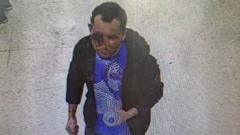3 hours ago
About sharing
A church which supported the asylum claim of the Clapham alkali attacker limited his rights to attend services after a sexual assault conviction, newly released documents reveal.
Abdul Shokoor Ezedi’s body was found in the river Thames in February, ending a police hunt after a mother and her children were attacked in January.
Ezedi won asylum in 2020 after proving his conversion to Christianity,
He was given a Muslim funeral and burial in London, the BBC understands.
The request for a Muslim burial is believed to have come from friends and family.
The documents were issued by the court which handled his application.
Ezedi, 35, arrived in the UK in 2016 from Afghanistan, and was granted asylum after two applications and an appeal.
A key factor was his June 2018 baptism at Grange Road Baptist Church in Jarrow, South Tyneside, where he had been attending since 2016, according to the court documents.
The documents were released after several newspapers and broadcasters, including BBC News, applied for his paperwork from the First Tier Tribunal, which handles immigration and asylum applications.
A letter from Reverend Roy Merrin, former ministry team leader at Grange Road Baptist Church, said Ezedi had “established a good relationship with the other church members and is always willing to help as required”.
The letter, dated 28 August 2018, confirmed Ezedi’s baptism and stated: “Abdul has been ready to share his faith in Christ with non-Christians.
“I hope that this information will be of assistance, and I would support his application to remain in this country.”
The letter came eight months after Ezedi’s sex offences conviction.
The documents also show the car mechanic had argued that his conversion to Christianity was genuine, even though the original judge in his case doubted parts of his story. The tribunal questioned why a person who had been threatened by the Taliban would travel without his parents, who were also under threat.
Ezedi argued that it was his conversion to Christianity and the Taliban’s knowledge of this that made him particularly vulnerable, even though he could not prove how the Taliban would know this fact.
The original judge said: “The mass of inconsistencies in all three accounts mount up to paint a wholly unreliable and inconsistent picture and one which as a result must be considered to lack credibility.”
The judge did not believe that if Ezedi had been seriously injured, as he claimed, he would have been mobile enough to escape Afghanistan in a car and lorry as well as periods of walking. His appeal was handled by Collingwood Immigration Services in Newcastle-upon-Tyne.
The newly released documents detail how in February 2018, Abdul Ezedi was convicted of sexual assault and exposure. His sentence was suspended and he had to do unpaid work. In the documents he expressed shame for his actions and said he understood the importance of not lying.
The papers show that after his conviction, Ezedi had to agree to a safeguarding contract which stipulated that he should be accompanied to services at Grange Road Baptist Church by other males.
‘Pleasant, friendly’
Also in the documents bundle was a separate letter in July 2017, pre-dating Ezedi’s convictions, which saw him described by a project worker at the Catholic Diocese of Hexham and Newcastle Justice and Peace Refugee Project as a “pleasant, friendly and co-operative man”.
It detailed how he attended the project each week and “signs for a bag of food” as well as being given £25 in cash each month.
A spokesperson for the Diocese of Hexham and Newcastle said the letter from the project worker was “issued to assist with support from other agencies and not as part of an asylum claim”.
They added: “The Diocesan Justice and Peace Refugee Project is a charitable venture set up to serve people in severe need, providing, for instance, food parcels donated by individuals or parishes.
“Occasionally in cases of hardship it also gives a small donation in cash and supports people with second-hand clothing or shoes.
“It is not involved in asylum casework.”
It has also emerged that Ezedi was on medication for depression when he successfully applied for asylum.
‘Dignified burial’
Ezedi’s funeral was conducted by a mosque in west London, and he was given a Muslim burial at a cemetery in east London on 11 March, the BBC has learned.
He is not thought to have been known to the mosque which buried him.
“As a funeral directors, we don’t look into people’s past, we look at how we can help in a situation,” said the Muslim funeral director, who did not want to be named because of sensitivities surrounding the case.
“Our job was just to provide a dignified burial for the deceased.”
Those that run the mosque, at which a lot of worshippers have an Afghan background, say Ezedi had never been there.
The mosque often asks for donations to help with the funerals of those who died without known relatives, and frequently conducts funerals and burials for asylum seekers who die alone.
But when it asked for donations in this case, some from the community were upset.
One mosque-goer, who did not want to be identified, said Ezedi had “attacked innocent people” and as he had converted to Christianity, it was the “responsibility of the church to bury him according to his new belief or religion, not the mosque”.
Related Topics
23 February
4 February
